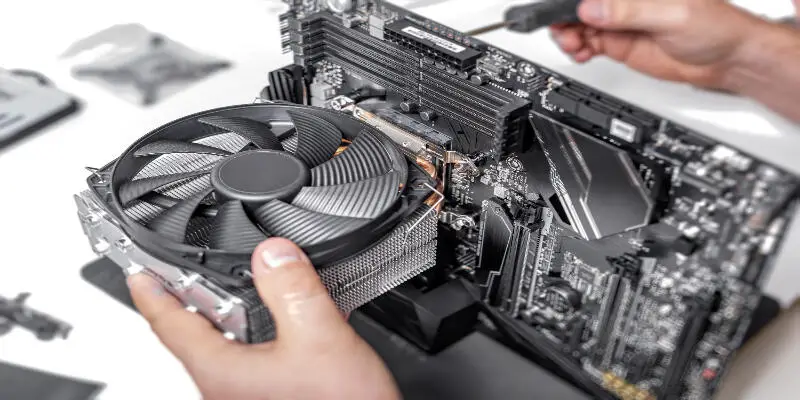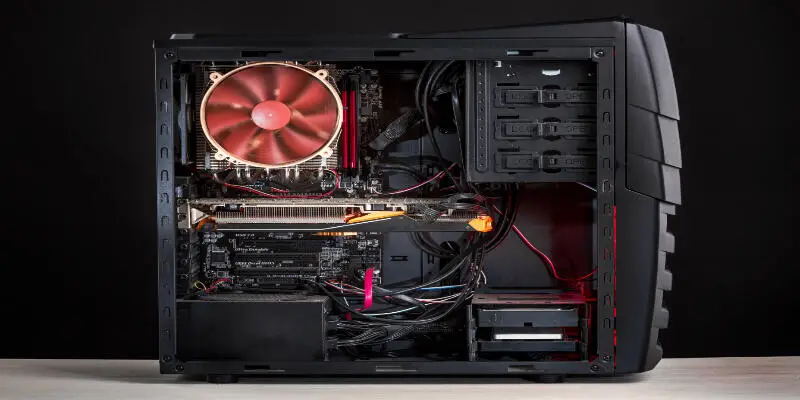Disclaimer: This post may contain affiliate links, meaning we get a small commission if you make a purchase through our links, at no cost to you. For more information, please visit our Disclaimer Page.
PC noise can be very irritating, especially when you want a peaceful environment to work on a project. Usually, the fans inside your casing are the main culprits. But other parts like the PC case, cooling system, power supply, etc. can all contribute to a frustrating experience. So, how can you reduce all this noise?
Installing a powerful but efficient fan will reduce most of the potential noise. Choose a PC case that cancels vibration and noise. You can also choose a liquid cooling system for your PC which will be quieter. Plus, make sure all the parts are tightly fitted to prevent excess vibration.
A loud PC can often implicate that there are problems inside your computer’s hardware. So, knowing why this happens and how to deal with it is essential to ensure a long computer life.
So, come with me as I take a deeper dive into the inner mechanisms of a PC. I will go over the reasons your pc can produce excess noise and how to negate those issues. I will also explain some of the larger problems you can face if these issues are not solved.
Table of Contents
How does a PC Generate Noise?
This part is important to know before we progress any further. Because your computer, like any other machines, will produce some level of sound. So, a certain level of noise is perfectly normal and expected from a computer.
The main source of any sound is friction between objects. When your PC is on, the parts inside the hardware are constantly turning and moving. This will eventually start vibrating the entire casing and produce sound.
Simultaneously, the friction also generates heat. Now, excess heat inside your hardware is not good for performance or longevity. So, the fans integrated inside the case will start rotating.
This will force the heat out but as a side-effect, will generate even more sound. Typically, it is the fans in your PC that make the most noise.
Some of the internal components will generate noise when they operate. A very common example is the sound coming from the hard drive. Usually, if these parts are defective or have sustained damage, they will generate loud clicking and grinding sounds.
Why is my PC so loud?
Your computer produces noise through multiple factors. Most of these factors are co-related. Meaning fixing one will often fix some of the other. So, let’s discuss some of the most common causes for a loud PC:
Over-clocked/Over-heated PC
As I explained earlier, your PC will naturally produce noise when it is running. The more you work your PC, the more power it will use. As a result, it is likely to generate more noise as well.
Heat is also generated in proportion to the power your PC consumes. So, the inside starts to get hotter and hotter which makes the fan spin faster. This also has the effect of adding to the vibration and noise.
So, overworking your PC beyond its limit will surely increase the sound that comes out of it. Also, if your computer’s limit decreases due to age or malfunction, it will get over-clocked much sooner.
Low-quality/Insufficient Fan
I already mentioned how fans can make a loud sound when your PC gets overworked. However, that is not the only time this can happen.
The fans in your air-cooled system may get clogged with dust and other particles. Sometimes it may get damaged trying to move it or during maintenance. When this happens, the propeller in the fan will not rotate properly. So, you will hear a lot of vibration and sound from your PC.
Other times the fans inside your CPU cooler are just not powerful enough to properly cool your hardware. This can also lead to overheating and produce a loud sound.
Loose Components
There are many components inside your CPU that are detachable (hard drive, RAM, video card, etc.). These parts will normally vibrate when the power is on and the device is running.
If you do not attach these parts tightly and to the right ports, they will amplify the vibration many times over.
As a result, the inside of your computer will sound like a broken blender. It may lead to permanent damage as well.
Problem with the PC case
The case itself can be an issue sometimes. This part is also made up of separate parts that are joined by bolts and screws. So, they can also vibrate if not attached correctly.
Not all cases are constructed the same way nor will they perform similarly. If your case is of low quality, it may accentuate the noise problem further.
Noise coming from the Hard Drive
Sometimes it is not a problem with the case or with any other detachable parts. Sometimes your hard drive (or hard disk, HDD) will be the source of all the commotion.
The hard drive stores and scans a lot of data for you. Inside the device, there are many smaller gears and mechanisms. If any of these parts happen to be defective, they will not work properly.
Then you will start to hear a loud grinding sound the moment you try to run your computer.
The condition of the hard drive may also deteriorate with age. No machine is permanent and the hard drive will accumulate damage. The smaller fragments inside may start to jam or stop working altogether. Either way, the result will be the same.
Noise From The Power Supply
Most people either forget or neglect this component. So, they end up with low-quality power supply units (PSU) that start to problems pretty soon.
The power supply has its own cooling system and fans. If this gets overheated or if the screws become loose, it will produce a noticeable amount of sound. I have seen plenty of computers where one of the main sources of excess noise comes from the faulty power supply.
Is A Loud PC Bad?
More often than not, a loud PC is a bad PC. Sometimes the source of the noise is simple and can be fixed readily. But you should not take that risk. If you hear unnaturally loud and constant noise, you should immediately look into it.
As you know by now, loud sound and vibration are a common sign for a faltering fan or hard drive. An ineffective fan will make your computer hotter than the normal safe temperature for this type of device.
This will severely hinder its performance and decrease the lifespan of your product.
If the problem lies with the hard drive, then your information will be at substantial risk. You may end up losing most if not all your valuable information.
The sound can also indicate that you have not properly screwed all the bolts or attached all the parts. On its own, this is not too much of a major problem.
But it can lead to complications when transporting the computer or any of its parts. Also, loosely connected hardware will not function effectively either.
Plus, there is an overall effect on the environment. You cannot concentrate much with constant rattling and grinding noises coming out. This becomes worse in an office place where the noise will disturb everybody’s peace.
How Loud Is A Normal PC?
The standard PC generates noise between 30 to 50 decibels. This is tolerable as it is below the level where the sound starts to become irritating or harmful. Usually, this comes off as a gentle humming or vibrating sound that stays in the background.
For most people, sound becomes annoying around 70 decibels. This is the noise you hear from traffic or loud construction. The normal noise level in most office spaces is clocked at 50 decibels or lower.
So, if your computer does not exceed 50 decibels, you should not worry too much. However, some may find it distracting at 50 decibels when they are very close to the PC for a long time.
So, you can customize your setup to bring the noise around 40. At this level, you will be aware that your PC running without feeling annoyed.
5 tips on how to make PC Quieter!
Okay, now let’s talk about fixing this issue to avoid future complications. Keep in mind that I am covering the most common factors that contribute to a noisy PC and how to solve them.
These solutions will get the job done in most cases. However, if you still encounter a noise problem, it is best to take your PC to an expert.
Get a Better Fan
You should think carefully before you commit to the fan for your Pc. Companies now produce fans that are as silent as they can make them. But you should also consider whether the fan is sufficient for your setup.
If it is not, then it will not cool your CPU properly or generate too much noise. So, talk to your supplier and get a fan that perfectly fits your PC build.
If you already got one and are now making constant noise, you should probably replace it. Make sure to get a fan that fits the slot in your PC case.
Change Your PC Case
The case may have deteriorated with age and it is not as robust as before. Perhaps the material is not good enough to reduce vibrations. Either way, changing your current case to a better, quieter one will keep the noise to a minimum.
Manufacturers are making cases with material that specifically helps to lower the vibration and the sound. Quality cases also help with the cooling process and keeping your PC dust-free. So, these cases are very quiet and peaceful to use.
If you are planning to buy a new PC, put some thought into the casing as well. Also, remember to properly turn in all the screws in place.
Phanteks Eclipse P600S, be Quiet Silent Base, etc. are some of the best cases out there for this purpose. These may cost you more than standard models. But they will be worth it.
Switch to a Liquid/Water Cooling System
If you are willing to go to the next level, then changing your CPU cooler from the standard air cooler to a liquid cooler may be an option. Recently, a lot of PC owners are going with the liquid option for a multitude of reasons.
The primary allure of a liquid-cooled system is that it allows you overclocking capability. This is possible because liquid coolant has more heat capacity than air. So, the liquid can cool your computer more efficiently than any fan.
The more you work your PC, the hotter it is going to become. To keep this in check, your fans will go into overdrive to compensate. But this will invariably create a lot of noise in the process and your computer may still end up overheated.
For people who consistently overclock their hardware, a liquid cooler will be more efficient and tranquil. Plus, liquid coolers are typically quieter than most air systems available, regardless of how much you are pushing your PC.
Noctuna and Be-Quiet are two brands I personally recommend. Also, if you can bear the expanse, go with a custom cooler. This way your cooling system will perfectly complement your enter setup. Otherwise, the All-in-one (AIO) coolers are perfectly serviceable.
Silent Power Supply
The power supply can also contribute to an irritating environment. If you have the option of going with a silent and efficient power supply unit when you buy your PC, then take it. If not, you may need to change it.
But first, you should check a few things. Look at the fan in the PSU and make sure it is not being blocked by anything. There should be a constant flow of air in and out of the PSU. Also, check if the noise is coming due to unsecured mounting screws.
If the problem persists, you need to think about changing it. Now, changing your power supply is simple as you will not have to re-organize your entire setup to that. But it will be an expensive upgrade.
My recommendation goes to the Seasonic Prime and Be-Quiet series of titanium PSU. They are safe, reliable, and silent. Perfect PSUs for home and the office area.
Properly Secure All the Screws and Bolts
This sounds like a very basic thing to say, but you will be surprised how many headaches this causes. Sometimes the root of the problem is as simple as a few bolts and screws not put in place properly.
This happens mostly with the PC case. So, double-check the entire casing after putting it together to be absolutely sure. Do this for any part that has mounting screws attached. If any of them are loose, take a screwdriver and tightly secure them.
While you are putting everything together, make sure all the detachable parts have been tightly fitted to their proper slots. Over time, these parts may also start to vibrate and create noise.
How Can I Make My Fan Quieter?
I have already discussed how changing your fans is a viable option in keeping the noise down. However, sometimes this may not solve the problem. Sometimes the problem is not with the fan itself, rather how you are operating it. If this is indeed the case, then buying a new fan will seldom do you any good.
The fan rotation will alter depending on how much heat is being produced if at all. But you can manually change the setting with your PC through the use of software.
So, when you do not want to change the air cooler fans, you still have a couple of options to mitigate the noise.
Performing these tasks will benefit you in two ways mainly. In the short term, it will keep the noise pollution down while not affecting the performance. Additionally, it will go a long way in increasing your computer life. So, here are some tips for your PC’s fans:
Control Your Fans Output With Software
This is viable when the power supply for the fan is derived from the motherboard. Otherwise, this method simply will not work.
The fans in your computer do not have to operate at full power constantly. They are only needed when the temperature reaches a dangerous level (usually, above 80 degrees Celsius). But sometimes the fans will rotate even when the heat is well below the standard level. You can prevent this from inside your PC.
To do this, you first need to enter your motherboard BIOS program. Press the DEL or F2 button during the setup of your computer and you will find yourself in the BIOS menu
. Go to the menu called “Hardware Monitor”. Then, navigate to the option that allows you to control your fans.
Different BIOS is going to have different designs. But the basic elements will be pretty similar. Once you are in there, you can adjust the fan to a setting of your choosing.
Modern BIOS has a graph that lets you set the fan speed according to different temperature points. Simpler BIOS will have pre-determined settings such as “Auto” and “Silent”.
Clean Your Fans Regularly
This is a part of regular maintenance that every good PC owner should be completing. If you want your tools to last long, you have to preserve them properly.
Dusty, clogged-up fans are a common source of PC noise. And dust will accumulate even though modern fans have dust-resistant materials. So, you should check these parts once every one or two months at least.
Take a clean microfiber cloth or a clean brush and remove all the dust bunnies. You can be more efficient and use a compressed air can. But be careful with this tool. Always remember to push the dust away from your computer and not into it.
Give Them Enough Space
When you are setting up your PC, remember to place it in a spot where it receives plenty of ventilation. If the air cannot get out, neither will the heat.
This will lead to overheating and loud, annoying noises. It will also shorten your PC’s lifespan and hinder its performance.
If this is your home PC, then place it near the window or the door. If it is on an office floor, ensure there is proper ventilation throughout.
Also, do not cover the CPU with a rag or a sheet, especially the part where the fans are. That will just prevent a smooth airflow and create problems.
Conclusion
PCs have become an integral part of so many people’s lives. And you want to operate it as smoothly and peacefully as possible to get the maximum result. Hopefully, with the insight I gave here, you can do just that.



